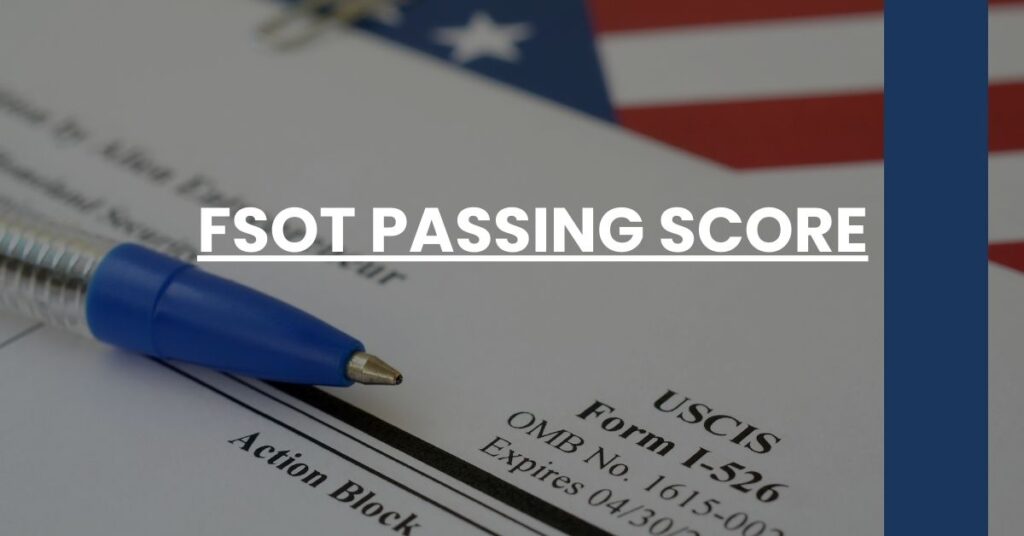The FSOT passing score, which once stood as a definitive benchmark at 154, has evolved into a more nuanced component within a holistic candidate evaluation system.
If you’re aiming for a career with the U.S. diplomatic corps, understanding the FSOT scoring is essential, yet it’s just one piece of the puzzle in the comprehensive Foreign Service Officer selection process.
In exploring the FSOT’s role, you’ll learn about:
- The updated scoring approach blending with the Qualifications Evaluation Panel (QEP)
- Score components and their weighting
- Preparation strategies to help you achieve your best possible performance
Stay informed and ahead in your journey to becoming a Foreign Service Officer with our insights on the FSOT.
- Understanding the FSOT
- The FSOT Passing Score Explained
- Factors Influencing the FSOT Passing Score
- Historical Trends in FSOT Scores
- Score Components and Weighting
- After the FSOT: Next Steps Upon Passing
- Preparing for the FSOT: Tips and Strategies
- Frequently Asked Questions About FSOT Scores
- Conclusion: Navigating the FSOT Successfully
Understanding the FSOT
The Foreign Service Officer Test (FSOT) is your gateway to becoming a diplomat, a representative of the United States to the world. As you’re exploring this career path, it’s essential to grasp the role that the FSOT plays in the selection process.
Why the FSOT Matters: The FSOT assesses various competencies essential for a Foreign Service Officer (FSO), including knowledge of American government and politics, economics, world history, and geography. It also evaluates your ability to communicate effectively in writing – a crucial skill for drafting reports and diplomatic cables.
Before you delve into the nuances of the fsot passing score, let’s review the eligibility criteria for taking the FSOT. To sit for the exam, you must be a U.S. citizen, at least 20, and no older than 59 years of age at the time of registration. You must also be available for worldwide assignments, including positions in difficult and even dangerous environments.
The Structure of the FSOT
The FSOT is divided into four sections:
- Job Knowledge: Measures your grasp of U.S. and world affairs, economics, math, and technology.
- Biographic Questionnaire: Assesses your background and experiences to predict your success as an FSO.
- English Expression: Evaluates grammar, vocabulary, and overall writing skills.
- Essay: Judges your ability to construct a well-argued and coherent essay on a given topic.
To understand how you’ll be evaluated, visit the Pearson Vue FSOT page which offers further detailed insights on each FSOT component.
Now, let’s focus on how the FSOT scores are interpreted and what they mean for your candidacy.
The FSOT Passing Score Explained
You might be wondering, “What exactly is the fsot passing score?” The FSOT itself is scored on a scale; previously, a score of at least 154 out of 200 was accepted as a fleeting guideline for passing. However, you should note that the State Department no longer publishes a fixed fsot passing score. The focus has shifted towards a more comprehensive review of a candidate’s profile during the entire selection process.
The current approach compliments your FSOT score with the Qualifications Evaluation Panel (QEP) assessments. Hence, there is no definitive “pass or fail” cut-off mark anymore; rather, your score is part of a cumulative assessment of your capabilities.
Understanding this nuanced scoring system positions you to better align your preparation with what is actually evaluated. You can learn more about these changes to the FSOT and the selection process to tailor your preparation effectively.
Factors Influencing the FSOT Passing Score
The threshold for what is considered a passing FSOT score is influenced by several factors. While the State Department shrouds the exact details in secrecy, changes in the difficulty of the test or the overall quality of the applicant pool for a given year could potentially affect the baseline for what might constitute a “good” score.
For instance, a particularly challenging test version or an abundance of high-scoring candidates may nudge the notional passing threshold higher for that exam cycle. Conversely, a less challenging test or fewer outstanding scores could result in a lower comparative passing score. Always bear in mind that your score is evaluated in context – not just as a stand-alone figure.
Historical Trends in FSOT Scores
What does the evolution of FSOT scores say about the selection process? In the past, the fsot passing score might have been seen as a rigid gatekeeper, filtering out candidates before additional review. As the Foreign Service seeks to select officers with a rich tapestry of skills and experiences, the scoring system has been modified to reflect this change in priorities.
Historically, adjustments in the passing score have signaled the Department’s shifting emphasis on various aspects of candidate’s qualifications. The current methodology, which assesses scores dynamically as part of a broader spectrum of qualifications, suggests a movement towards a more holistic approach.
By understanding these trends and the rationale behind them, you can better strategize your preparation. Remember, achieving a high FSOT score is about demonstrating a robust command over a wide range of relevant knowledge domains, as well as skills and personal characteristics essential to representing the U.S. on the global stage. Take a closer look at how the selection process now considers the full context of a candidate’s qualifications, beyond just their test performance.
Score Components and Weighting
As you prepare for the FSOT, understanding the weight and composition of its score components can give you an edge. Each part of the exam not only challenges different skill sets but also contributes uniquely to your overall performance.
- Job Knowledge (60%): This section encompasses topics ranging from U.S. and world history to management principles and economic concepts. Success here requires a breadth of knowledge. It arguably carries the most weight because it directly relates to the competencies required on the job.
- English Expression (30%): Grammar and writing skills take the spotlight here. How well you convey ideas and organize thoughts is pivotal, as communication is a cornerstone of diplomacy.
- Biographic Questionnaire and Essay (10%): These sections might seem less quantifiable but are incredibly telling. They provide a lens into your experiences and your ability to persuasively and coherently formulate arguments.
To distill this down even further, you can find resources that delve into the intricacies of each section at Test Prep Review. Here, you can discover practice questions and insightful tips to guide your study plan.
Now, you may wonder how these sections are aggregated into a final score and what that means for the elusive fsot passing score. Remember, with the changing nature of the scoring system, these scores are interpreted alongside other candidate evaluations, but a strong performance in all these areas maximizes your chances of advancing in the selection process.
Let’s turn the page to what happens once you’ve conquered the FSOT, an equally crucial phase that beckons your attention if you’ve got your eye on a coveted FSO position.
After the FSOT: Next Steps Upon Passing
Congratulations—your hard work has paid off, and you’ve achieved a competitive FSOT score! What now? Passing the FSOT is a momentous achievement, but it’s only the beginning of your journey. The next phases of the selection process await:
- Personal Narratives: This is where you get to tell your story. Tailoring your narratives to demonstrate how your experiences align with the dimensions sought after in Foreign Service Officers is key.
- Oral Assessment: Should you advance, you’ll showcase your interpersonal, analytical, and management skills through group exercises, interviews, and case management.
- Security Clearance and Medical Clearance: As part of the vetting process, you’ll need to obtain a security and medical clearance, confirming you’re fit for service.
- Final Review Panel and Register: This last stage involves a thorough review by a panel to assess your suitability for being a diplomat, leading to placement on the Foreign Service Register.
Each of these steps is explained in greater detail by those who’ve experienced them, providing real-life examples and expectations. A closer look at the process by a recent candidate can be found at What Diplomats Do, which can give you a nuanced understanding beyond the fsot passing score.
Achieving success at each milestone requires persistence and preparation. With the right mindset and tools at your disposal, you can navigate these challenges with confidence. Let’s now switch gears to focus on precisely that—how best to prepare for the FSOT.
Preparing for the FSOT: Tips and Strategies
While there isn’t a magic formula for passing the FSOT, certain strategies can significantly increase your odds of success. Here’s a roundup of tips to add to your prep arsenal:
- Study in Segments: Break down the vast array of subject matter into manageable chunks. Focus on one category at a time to avoid being overwhelmed.
- Practice Tests: Regularly take full-length practice exams under timed conditions. They are essential to acclimatize to the test’s pacing and format.
- Know Your Resources: Use a mix of study materials, from FSOT-specific review books to newspapers and academic journals, to sharpen your knowledge and stay up-to-date.
- Reflect and Review: Analyze your practice test results to identify and fortify your weak spots.
A rounded preparation strategy goes beyond memorizing facts; it involves honing test-taking strategies and staying informed on world events. Utilize a comprehensive resource like Path to Foreign Service, which can lead you through the nuances of FSOT prep and provide key insights into tackling each section efficiently.
Frequently Asked Questions About FSOT Scores
There are always queries surrounding the fsot passing score and scoring system. Let’s address a few:
- Can I retake the FSOT if I don’t pass? Yes, candidates are allowed to retake the FSOT, but there is a waiting period between attempts, typically one year.
- How long are FSOT scores valid? Your FSOT score is valid for the duration of the specific selection process. If you pass the FSOT but do not proceed beyond the QEP that year, you’ll need to retake the exam in a future cycle.
- What should I do if I don’t understand my score report? If anything about your score report is unclear, reach out to the State Department’s Bureau of Human Resources for clarification.
While this section doesn’t cover every question, it highlights the importance of understanding your FSOT results and the implications of your scores.
Conclusion: Navigating the FSOT Successfully
Embarking on the journey to becoming a Foreign Service Officer is a profoundly rewarding endeavor. Remember, while the fsot passing score is an important milestone, it’s part of a larger tapestry of qualifications that comprise your candidacy for this prestigious role.
Your path to a career in the Foreign Service is unique, marked by its own achievements and challenges. Yet, by demystifying the FSOT passing score and the subsequent stages, you can approach each phase with confidence and clarity.
Leverage the resources, strategies, and insights shared in this guide as you prepare for the FSOT and beyond. With determination and thoughtful preparation, you are well on your way to succeeding in one of the most respected professions—representing your country on the global stage.
FSOT passing score insights for aspiring diplomats. Learn the requirements to succeed on the Foreign Service Officer Test.

